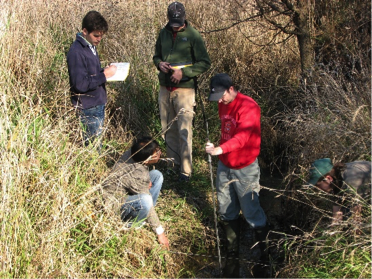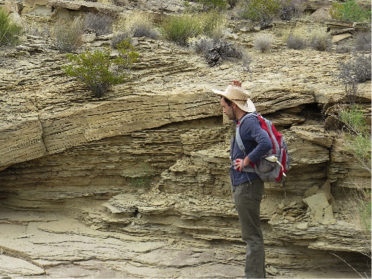
Education:
BSc – Institut National Polytechniques de Toulouse – Agricultural and Environnemental Engineering
MSc – Institut National Polytechniques de Toulouse – Hydrochemistry, Hydrology, Soil and Environment
PhD – University of Utah (USA) – Geology/Geochemistry
Current position: I am a postdoc at the department of Geological Sciences at the University of North Carolina (USA). I recently accepted a faculty position at the department of Earth and Environmental Sciences at the University of Ottawa. I will start on September 1st 2017 and I am looking for motivated students to start this great adventure!
Past positions: I worked in the environmental industry in France during my Masters degree mostly around rehabilitating ancient mining areas as natural reserved. I also worked for Chevron Corporation in Houston for a couple of years after my PhD as an organic geochemist in upstream petroleum exploration.
Website: https://clementbataille.wixsite.com/earthscience
Email: clement.bataille@gmail.com
Why did you choose a career in earth science?
Growing up in a little village of southern France, close to the famous wine region of Bordeaux, I was drawn from an early age to consider the effects of the environment on the biosphere. At the core of the wine making country is the notion of terroir, a patch of land with unique pedological, geographical, geological, and climatic signature that gives specific characteristics to agricultural products. For example, rich soil and long periods of sunlight gives Mediterranean a wine a sweet fruity flavor, while the cold temperature and poor calcareous soil of Bourgogne brings complexity to the Champagne flavor. My childhood trained me to think about the ecosystem as a whole, yet interconnected by both human and natural variables. Years later, having honed my research interests over the course of a Master's and PhD degree, and then through industry related research, I find that I've just begun to discover what exciting mysteries are lying throughout the pages of earth's surface...we just have to know how to read them, and isotope geochemistry is a fabulous translator of the Earth’s novels!
How is some of the work you've done relevant to Canadians?

A big part of my work is to be a forensics detective using geoprofiling methods… I trace the provenance and movements of animals and products by using isotope geochemistry and geoinformatics! Different rocks have different but predictable strontium isotope signature. Those specific geochemical signatures are transmitted to living beings through the ingestion of local water and food. For instance, the strontium isotopes in your teeth looks like the strontium isotopes of the place where you grew-up! So, for me an immigrant from France, the geochemistry of my teeth still tells that I was born in France! The models I have developed can be used for many applications of provenance. Some are particularly relevant to Canada such as tracking the movements of Pacific salmon, caribous or monarch butterflies for population conservation, authenticating food provenance like Quebec wines, or fingerprinting unidentified
human remains in archeology! Check out my website or
contact me if you want to learn more about my research.
Where do you hope your career will take you next?

At the heart of a faculty job is the idea of being a teacher. Several of my major career path decisions were inspired by exceptional teachers who not only transmitted knowledge but also encouraged discussions, challenged me, and ultimately took teaching to a level beyond mere instruction. My first hope for my career is to give back what I have received. I want to become an inspiring teacher and mentor. I will borrow some words of my favorite author Antoine de Saint Exupery to describe my approach to teaching: “If you want to build a ship, don’t gather people to assemble wood, cut planks, and start distributing work; rather, teach them to long
for the endless immensity of the sea.”
At the heart of a professor’s job is also the idea of being a scholar. As scientists, we are contributing to the construction of a pyramid of human knowledge that helps us answer the challenges of human life on this planet. My hope is to be a part of this great history and to contribute my little stone to the edifice of knowledge so that the present and future generations can better understand the natural system around us. More practically, at the heart of my research are very actual questions of water pollution, climate change, and ecology – all of which have direct implications for our societies. My hope is to be a scientist that is rooted to my local community to resolve specific challenges. For instance, I hope to establish a river observatory network on the Ottawa River to better understand the controls of river water chemistry with implications for conservation policies and human health.
Right: Sampling watersheds to understand the impact of agricultural practices on water quality in Indiana (USA). Left: Sampling ancient fluvial channels to study the impact of greenhouse climate on ancient fluvial system in Big Bend National Park, West Texas (USA).
What do you wish the public knew about earth science?
As scientists, we have a true responsibility to make our research accessible and understandable for the public. We are using tremendous amounts of tax-payer money, and people have a right to understand why. I fully believe that it is our responsibility to communicate our results to the public and to do our best to provide metrics to policy-makers to assess the benefit of our research.
As geologists, we have the advantage of teaching and researching on topics related to major societal issues such as energy, global change, and sustainability. However, the benefits of scientific knowledge are sometimes hard to quantify in terms of immediate profits. For instance, the pioneering findings of Marie Currie did not become useful during her lifetime. Some discoveries are also not directly “marketable.” For instance, research on dinosaurs’ behavior provides little financial benefits but has allowed generations of humans to marvel. I would love for these hidden benefits to be better understood and acknowledged by the public. This is our role as teachers and scholars to help our societies understand and appreciate the benefit of our research.
Views expressed in blog posts reflect those of the author, and not necessarily those of the CFES.




